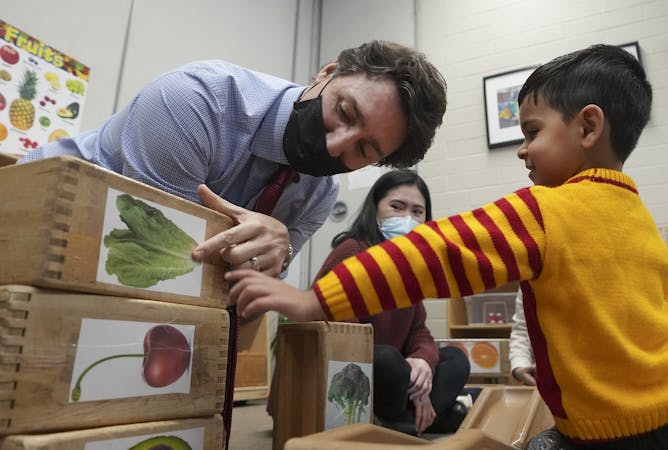|
|
|
|
The trilling melody of the western chorus frog, a small, smooth-skinned, green-ish, grey-ish brown amphibian, has echoed through the wetlands of Canada for eons. These tiny creatures have been a critical part of the Canadian ecosystem, mainly because of their role in controlling the insect population.
However, increasing habitat loss, disease, pollution, harvesting, invasive species and climate change have led to a decline in the population of these frogs over the past 60 years. Historically one of the most abundant amphibians in eastern Ontario and Québec, the now-threatened western chorus frog is found in only 10 per cent of its original range.
But researchers are far from losing hope.
Today in The Conversation Canada, Jeffrey Ethier and Vance Trudeau from the University of Ottawa explain how this threatened frog population can be restored across Canada once again.
They believe that habitat protection and restoration, advanced reproductive technologies and effective reintroduction procedures could help slow further declines of these frogs and could also help other threatened amphibians.
Also today:
All the best,
|

|
Freny Fernandes
Editor
|
|

The population of western chorus frogs has been declining over the past 60 years and continues to be an issue across Canada.
(Shutterstock)
Jeffrey P. Ethier, L’Université d’Ottawa/University of Ottawa; Vance L Trudeau, L’Université d’Ottawa/University of Ottawa
Habitat protection and restoration, advanced reproductive technologies and reintroduction procedures could help slow the decline of western chorus frogs and other amphibians.
|

Drawing of St. Peter’s cathedral, Rome, with the Vatican wall in the left distance, c. 1640.
(The Trustees of the British Museum)
Roberto Perin, York University, Canada
Residential schools and the papal bulls justifying the doctrine of discovery call out for concrete acts of atonement and reparation on the part of the church.
|

With governments seemingly giving up their responsibility to keep people safe, it is time for businesses to take the lead on health and safety.
(AP Photo/Seth Wenig)
Maxim Voronov, York University, Canada; Burkard Eberlein, York University, Canada
We expect businesses to be more socially and environmentally responsible by minimizing greenhouse gas emissions and eliminating harmful business practices — why don’t we do the same for COVID-19?
|

Canadian Prime Minister Justin Trudeau, left, plays with children in an early learning and child care centre in Brampton, Ont., March 28, 2022.
THE CANADIAN PRESS/Nathan Denette
Emis Akbari, University of Toronto; Isabelle Vinet
Where new early learning and child-care programs are located, how they are designed, built and resourced, and what they teach can either add to the problem of climate change or help mitigate it.
|

Sturdy yet flexible, hygienic, disposable, readily available and cheap … the plastic straw is better than any eco-alternative for many disabled folks.
(Shutterstock)
Michelle Hewitt, University of British Columbia
Placing plastic straws, a life sustaining accessibility tool, under the same restrictions for sale as tobacco products is overly harsh, and detrimental to the dignity and inclusion of disabled people
|

Peter Thiel, co-founder of PayPal and Palantir, delivers a keynote speech at the Bitcoin Conference in April in Miami Beach, Fla.
(AP Photo/Rebecca Blackwell)
Annie Lecompte, Université du Québec à Montréal (UQAM)
The craze for crypto-currencies continues to grow. However, the environment is risky for investors, not only in terms of volatility, but also because of fraud.
|

Feeling nostalgic isn’t proof of how things used to be.
(Shutterstock)
Lisa Farley, York University, Canada; Debbie Sonu, Hunter College; Julie C. Garlen, Carleton University; Sandra Chang-Kredl, Concordia University
Childhood wasn’t more ‘innocent’ or ‘natural’ before digital technologies or the pandemic.
|
La Conversation Canada
|

Le Pape François salue une foule de fidèles et de pèlerins, le 6 juin 2021, au Vatican. Le pape a alors exprimé sa tristesse à suite de la découverte au Canada des restes de 215 élèves d'un pensionnat.
(AP Photo/Domenico Stinellis)
Marie-Pierre Bousquet, Université de Montréal
La visite du pape François concerne tous les Canadiens. Son enjeu est notre rapport à l’histoire, celle de la construction d’un État qui a marginalisé les Autochtones et tenté de les assimiler.
|
Ukraine Invasion
|
-
Wandile Sihlobo, Stellenbosch University
If Russia keeps its word, the benefits will be immediate. Grain prices could soften as more grain supplies become available to the world market.
-
Alexander Gillespie, University of Waikato
No one knows what Vladimir Putin’s peace terms for Ukraine might be, but the risk of war spreading means the West must propose its own.
-
Christoph Bluth, University of Bradford
Concerns about aggression from North Korea and China might drive some Asian countries to develop their own nuclear arsenals.
|
|
COVID-19
|
-
Patrick Jackson, University of Virginia
According to a letter from Biden’s doctor, the president has a runny nose, mild fatigue and a slight cough. The letter also noted that Biden began taking an antiviral drug the morning he tested positive.
|
|
Environment + Energy
|
-
Rowena Hill, Nottingham Trent University
With extreme weather events becoming more common, the fire and rescue service will need to change its approach.
|
|
Politics
|
-
Tim Bakken, United States Military Academy West Point
With the exception of a few states, dereliction of a duty is mostly used in military law and does not apply to citizens, including US presidents.
|
|
Science + Tech
|
-
Stacy Morford, The Conversation
With decades of images and data from the same locations, these satellites can show changes over time, including deforestation, changes in waterways and how loss of trees corresponds to urban heat.
|
|
|
|
| |
| |
| |
| |
|
|
|
|
|
|
|